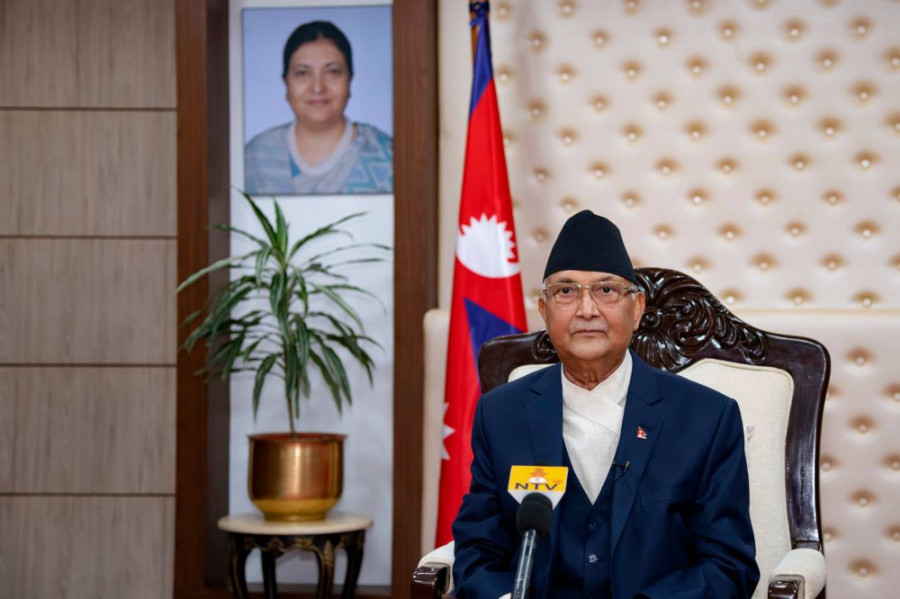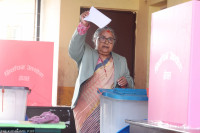Politics
A third of Oli’s Cabinet ministers are not members of federal parliament
Analysts say the prime minister is demonstrating utter disregard for constitutional provisions for his political gains.
Binod Ghimire
The KP Sharma Oli Cabinet currently has 22 ministers—and a third of them are not members of the federal parliament.
Though the constitution allows the prime minister to appoint someone who is not a member of any House, Oli’s move is against the spirit of the provision, according to experts and analysts.
“This is an out and out misuse of the constitutional provision,” Daman Nath Dhungana, former speaker of the House of Representatives and a civil society member, told the Post.
Article 78 (1) of the Constitution of Nepal says that the President on the recommendation of the prime minister can appoint a person who is not a member of the federal parliament as a minister. But Article 78 (2) says such a minister must obtain membership of the federal parliament within six months from the date of taking oath. She or he loses their position in the Cabinet if they fail to obtain the membership in the prescribed time.
Since the constitution does not allow more than 25 ministers, Oli currently has 22 Cabinet ministers, including himself, and three state ministers.
Of the seven non-MP ministers in the Oli Cabinet, four were members of the lower house until a few days ago. One is on the verge of losing his National Assembly membership. All of them used to be members of the Communist Party of Nepal (Maoist Centre).
When the conflict within the then Nepal Communist Party (NCP) was at its peak last year, the two warring factions—one led by party chair and Prime Minister Oli and the other by Pushpa Kamal Dahal, the other chair, and Madhav Kumar Nepal, the party’s senior leader—wanted Home Minister Ram Bahadur Thapa on their side.
Thapa, Dahal’s former comrade in arms during the decade-long insurgency, was a member of the nine-member party Secretariat.
Thapa ultimately sided with Oli.
Minister of Industry, Commerce and Supplies Lekh Raj Bhatta was another Dahal ally who switched sides during the tug-of-war.
On December 25, days after seven ministers resigned in protest against the government’s December 20 decision to dissolve the House of Representatives, Oli appointed nine ministers, including a state minister, in replacement.
Five of them were formerly from Dahal’s Communist Party of Nepal (Maoist Centre) which had merged with Oli’s CPN-UML in May 2018 to form the Nepal Communist Party (NCP).
But on March 7, the Supreme Court invalidated the merger to revive the two constituent parties.
The Maoist Centre recalled its ministers but they did not resign.
Then it asked them to furnish clarifications. Some gave, some didn’t.
Clarifications of those who gave them were not found satisfactory.
The party then wrote to the House of Representative on April 6 and to the National Assembly on April 9 saying that five of its lawmakers—Industry Minister Bhatta, Energy Minister Top Bahadur Rayamajhi, Urban Development Minister Prabhu Sah, Labour Minister Gauri Shankar Chaudhary and Home Minister Thapa—had abandoned the party, asking the offices to strip them of their posts as per Sections 31 and 32 (1) (b) of the Political Party Act-2017.
According to Section 31 (1), one who is elected as a member of the federal parliament, provincial assembly or in the local government, cannot defect from the party they represent until the tenure of their positions. Section 31 (2) says if they defect the parties, they will automatically lose their elected position.
On April 8 the four lower house lawmakers were stripped of their positions.
However, Oli, on the very next day, reappointed the four lower house members as ministers with the same portfolios based on the constitutional provisions which allows a non-parliamentarian to become a minister for six months.
There were already two ministers—Water Supply Minister Mani Thapa, and Youth and Sports Minister Dawa Lama Tamang, who had been appointed on December 25 despite not being parliamentarians.
Being a close ally of Oli now, Thapa, the home minister, is likely to be reappointed a minister even if he loses the National Assembly membership.
Experts say the provision to allow a non-parliamentarian to become a minister for six months was envisioned to make way for experts or important personalities in politics if they are needed in the government.
When Oli reappointed Yubaraj Khatiwada the finance minister on March 5 last year, a day after he resigned from his position after his two-year tenure in the National Assembly expired, his move was not criticised as Khatiwada was deemed necessary in the Oli Cabinet as a technocrat. Experts say Oli doesn’t have any justification for the present move.
It is a democratic philosophy that people should be governed by their representatives, not by those who don’t represent them.
In a parliamentary system of governance, the government and ministers are accountable to Parliament, and by extension, they are accountable to the people who send their representatives to the Parliament.
But with no constituencies Oli’s seven ministers currently representing, questions arise who they are accountable to.
“Oli’s move may not be unconstitutional per se, but it is certainly illegitimate,” Ram Krishna Timalsena, former registrar at the Supreme Court and executive director of the National Law College, told the Post.
“Not everything is written in the constitution. It’s the responsibility of the executive to ensure the constitution is followed in the letter and spirit.”
Drafters of the constitution say appointing non-parliamentarians as ministers should be an exception and not a norm.
They say one either has to be a lawmaker or should have the prospect to be elected within six months to be a minister.
But with political uncertainty looming over the country, such by-elections are not likely within six months.
“Oli has breached the constitution by using the constitutional provisions meant for exceptional cases,” Ram Narayan Bidari, a member of the National Assembly who was a member of the Constitution Drafting Committee in the Second Constituent Assembly, told the Post. “This is the first time in Nepal’s history that around one third of the Cabinet ministers are non-parliamentarians,” added Bidari, who was nominated to the Assembly in the Maoist Centre quota.
With political instability and a faction of his party led by Madhav Kumar Nepal forming parallel committees across the country, Oli is in search of constituencies to bolster his political support.
Experts say Oli cannot bulldoze such decisions for his political gains and that he must justify why he is using the constitutional provisions to keep non-parliamentarians in his Cabinet.
“If there was a reason to appoint the non-parliamentarians as ministers, then Oli should inform the people about his compulsion to appoint one third of the ministers,” said Dhungana, the former House Speaker. “If Oli’s move is not criticised, he can appoint all his Cabinet members who are not parliamentarians. Oli is making one move after another towards discrediting and undoing the constitution.”




 27.41°C Kathmandu
27.41°C Kathmandu













